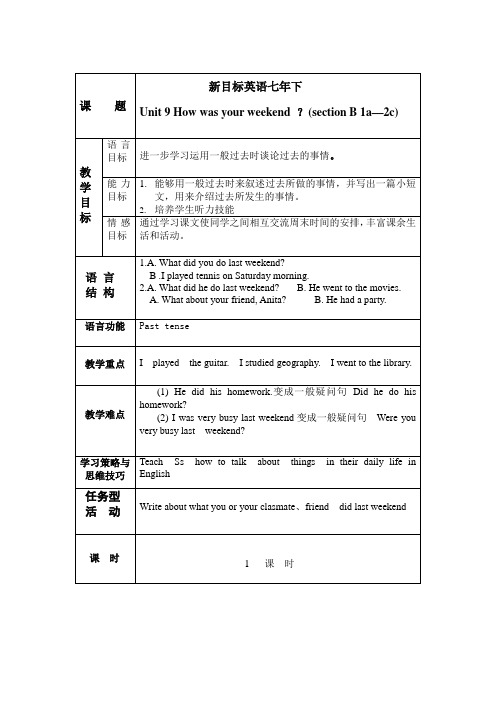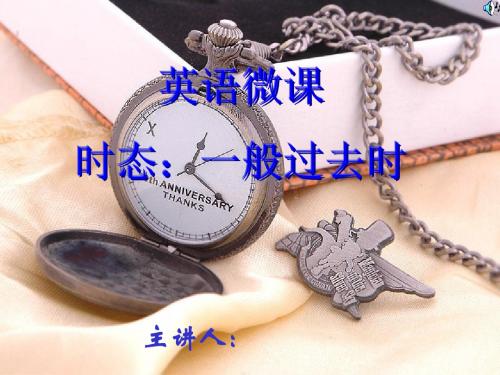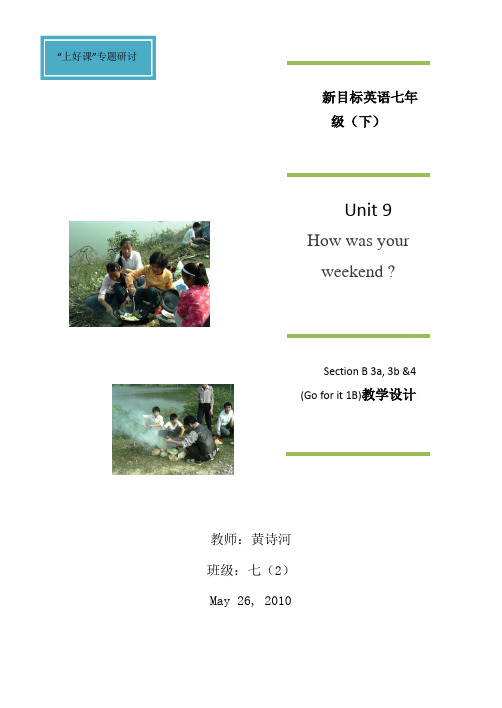Unit 9 How was your weekend
Unit 9 How was your weekend电子教案

2.Divide the students into several groups and let them make dialogues using these sentences: What did you do yesterday?
What did you do last weekend?
I played tennis.
How was your weekend?
It was OK.
Step 2. Presentation
1.Ask some questions:
1) How many students are there in our classroom?
How was your weekend? What did you do last weekend?
复备
作业
课后反思
课题
Unit 9 How was your weekend? (period 4)
教学目标
Talk about recent past events and think of the past events.
Step 4 Grammar focus
Read the notes on page 102
复备
作业
课后反思
课题
Unit 9 How was your weekend? (period 3)
教学目标
Talk about recent past events and think of the past events.
Then let them do it in pairs
Unit9_How_was_your_weekend展示课件

On Sunday afternoon,
I played tennis with my friends.
I had a busy but happy weekend. How about yours? Can you tell me now?
I am waiting I am waiting for your efor your email, now.
They painted on Sunday afternoon.
What did
your friend do last weekend…? she
She did homework on Sunday evening.
She did Chinese kung fu on Sunday evening.
… saw a movie/went to a movie
yesterday night
Titanic 泰坦尼克号
A: How often do you surf the Internet? yesterday. He played computer games B: Once a week.
shopping They went shopping on Saturday afternoon.
A: what did you do last weekend? B: On Saturday morning, I ________. On Saturday afternoon, I________. On Sunday morning, I _________. On Sunday afternoon, I ________. How about yours? A: …
watch TV read a story book play computer games do housework cook breakfast do homework clean my room go fishing listen to music play ping-pong ball help my parents on the field(地里)
Unit 9 How was your weekend

my weekend activities
Last weekend, I
clean ed my room play ed
went to the movies go
tennis
1.规则动词的过去式:
1)一般情况在动词原形后加-ed
2)以不发音e结尾的加-d 3)以辅音加y结尾的,去y变i加-ed 4)以重读闭音节结尾,末尾只有一个辅音字母, 先双写该辅音字母,再加-ed
What did you do last weekend?
played soccer
played volleyball
walked
played chess
painted
went to the beach
两人一组,选好题号,一人面向屏幕,表演图中内容,另一人猜测:
What did he/she do last weekend?
do last weekend?
did homework did Chinese kung fu
did some readin
do---did
Practice
• Ask and answer in pairs using the pictures • Play a guessing game • listen to 1b and 2a
●
Ⅳ Teaching Procedure
Lead—in ● Presentation ● Practice ● Summary ● Homework
●
lead--in
• Greetings and talking By talking about the daily activities, and lead in the new lesson. e.g. T: I usually clean the room and go to the movies on weekends. What do you do on weekends? S: I usually do my homework. S: I usually ........
How was your weekend 教案

Unit 9 How was your weekend?(section B 1a—2c)
played the guitarWhat did you/he/ do last weekend?
did one’s homeworkI played tennis/He went to the movies.
通过本节课的教学,让我也发现了自己的不足。我的课堂应变能力、驾驭课堂的能力要在以后加强。学生方面,应在今后的教学中多培养学生听、说的能力,在本节课中对于学生没能及时的鼓励表扬。优点在以后发扬,不足在以后的教学中就要改正。
教
学
步
骤
3.通过“猜猜村”等小游戏来练习用一般过去时来叙述过去所做的事情,通过小游戏提高学生的学习兴趣。
4.完成section B 1a,检测学生自学情况。
/i?ct=50331=%B5%AF%BC%AA%CB%FB%CD%BC%C6%AC&in=5628&cl=2&lm=-1&pn=27&rn=1&di=42510046143&ln=2000&fr=&fmq=&ic=&s=&se=&sme=0&tab=&width=&height=&face=&is=&istype=2
/i?ct=50331=%D7%F6%D7%F7%D2%B5%BF%A8%CD%A8&in=30016&cl=2&lm=-1&pn=0&rn=1&di=42519547950&ln=2000&fr=&fmq=&ic=&s=&se=&sme=0&tab=&width=&height=&face=&is=&istype=2#pn0&-1
Unit9 How was your weekend

--W__a_s_ he happy yesterday? -- Yes, he _w_a_s_./No, he _w_a_s_n_’t.
点拨:
学习一般过去时 要和一般现在时紧 密联系。
问句) --_D__id_ he _cl_e_a_n_ his room yesterday? -- Yes, he _d_i_d_./No, he _d_id_n_’.t
一般过去时句式结构变化
2、 very busy last Sunday.(否定句)
stop stopped plan planned trip tripped
study studied
carry carried Is/am was go went
规则动词词-ed的读音
清念 /t/ ,元浊/d/ ; /t/ /d/ 之后念/id/
说明: 1、清念 /t/ ,即 ed 在清辅音后面念 /t/ ,例:finished helped
初识一般过去时(The Simple Past Tense):
构成
主语+动词的过去式+其他
一般过去时
用法
1、表示过去某个时 间发生的动作或 存在的状态。
2、表示过去经常或 反复发生的动作。
常用时间
yesterday last night in 1990 two days ago
规则动词过去式的构成
英语微课 时态:一般过去时
主讲人:
I play soccer
on weekends.
I played basketball last weekend.
新课标七年级下Unit 9 How was your weekend教案

教师:黄诗河班级:七(2)May 26, 2010新目标英语七年级(下)Unit 9 How was yourweekend ?Section B 3a, 3b &4 (Go for it 1B)教学设计“上好课”专题研讨“上好课”专题研讨Unit 9 How was your weekend?教案In this unit, students learn to talk about recent past events.教学目标通过询问怎样过周末,来掌握各种动词词组,互相间谈论自己怎样过周末。
How did the kids spend the weekend?A:语言目标描述周末所做的事情或所开展的活动。
B:能力目标能够用一般过去时来叙述周末所做的事情,并写出一篇短文,用来介绍上周所发生的事情。
C:目标语言1. A. What did you do over the weekend?B. I played tennis on Saturday morning.A. How was your brother’s weekend?B. It was great.2. A. What did he do over the weekend?B. He went to the movies.A. What about your friend, Anita?B. He had a party.教学难点分析Talk about recent past events.1. 重点一般过去时:(1)过去时动词四种规则变化A. play-playedB. die-diedC. stop-stoppedD. study-studied(2)不规则变化is, am-was are-were do-did go-went have/has-had sit-sat get-got2. 难点(1) He did his homework. 变成一般疑问句Did he do his homework?(2) How was your weekend?(3) I was very busy last night. 变成一般疑问句Were you very busylast night?(4) She often came to help us.(5) …sth. terrible(nothing interesting, anything great等教学流程Step1: Duty reportT: Good morning, everyone.Who’s on duty today?S:I am.T:OK. Come here please.Step 2 Revision1)T: First of all, let’s review the past form of verbs.play—played visit—visited practice---practiced study----studiedStep 3Ask students to point to the pictures and use the past tense to describe as many of the activities as possible. Point to and describe any activities they can't describe. For example, I played the guitar.Then point to the numbered activities described in the list. Name the activities and ask students to repeat each one,After that, ask students to match each numbered phrase with a picture by writing the letter of each picture in the blank in front of the correct phrase. As students work, move around the room answering questions as needed.Check the answerStep 4Call attention to the names Jim and Sally and the write-on lines under each name.Say, Now you are going to hear a conversation between Jim and Sally. They are talking about what they did over the weekend. Listen to the conversation and write what each person did.Play the recording the first time. Students only listen.Point out the sample answer, cleaned her room.Play the recording again. Ask students to tell what each person did. Remind students that they can look back at earlier activities in this unit to get spelling help, if they wish.Step5Ask a pair of students to read the dialogue to the class.Say, Now practice talking about what Jim and Sally did over the weekend. Practice in pairs- Use the conversation as an example.Help students find partners. Then say. First read the dialogue together. Read both parts. Then make your own dialogues like that one. Tell what Sally and Jim did over the weekend.As students practice, move around the room monitoring progress.Ask pairs of students to present their dialogues to the class.Step 6Point out the example in speech bubbles. Ask two students to read the dialogue to the class.Ask a student to say a conversation about what you did over the weekend. Help students find partners. As they practice their conversations, move around the room monitoring progress and giving language support as needed.Ask some pairs to present their real-life conversations to the class. Step 7Read the article to the class or have a student do it.Some students may not recognize the words shopping, mixture, and relatives. Answer any question. students may have about these or other vocabulary items. Write each new word on the board and discuss its meaning.Read the instructions. Expand on the instructions saying, Circle the things that you like. the things that are fun. Underline the things that you don't like, the things that are not fun.Review the answers. Students may have different answers.Step 8Point out the numbered blanks in the paragraph. Say, Write a suitable phrase in each blank. Remember to put the verb in the past tense. Point out that students can look at the pictures below the passage for ideas.Call attention to the sample answer. Ask a student to read the sentence to the class,Ask students to complete the activity individually.Check the answers.Step 9Ask students to name several things; as they did over the weekend.Ask a student to follow these notes and say what he or she did over the weekend. When the student is finished say. Now write the words you just said.Ask the students who finish first to report their sentences.Check the sentences and make necessary corrections- Other students may use these sentences as they complete their own work.Step 10 A Game : Guess “Who am I?”Ask the class to give you the names of some famous people. They can be .sports stars, musicians, artists, politicians, etc.Divide students into pairs to do the activity. As students work, move around the room monitoring progress and making notes of common language problems. Have some students tell the class who their partners are and what their famous partners did over the weekend.ExercisesShow some exercises on the screen. Have students finish them with the target language in class.Step11 SummaryAsk students to report what we have learnt this class.HomeworkWrite an article about the last weekend.Teaching reflection:。
新目标英语七年级下Unit 9备课会整单元课件How was your weekend
Homework
Write down what You did on weekend.
How was your weekend?
The second period
一、 教材解析 (Material Interpretation)
**中心话题:谈论人们刚过去的活动。
1.语言目标: 掌握下列词汇短语 Geography, test, stay at home, practice, talk show, change, cat, anything, cook dinner, go for a walk, on Saturday morning 熟练掌握一般过去时规则动词加ed结构及和短语last week. yesterday等连用。 熟练掌握本单元内不规则动词was did went sat had did read saw wrote等。 熟练运用以下句型:
They had a basketball game.
They had a piano lesson/class.
have---had
Past forms of verbs:
Regular verbs Present Past played play cleaned clean stayed stay visited visit practiced practice studied study Irregular verbs Present Past did do went go have/has had was is/am were are
do last weekend?
did Chinese kung fu did … homework
do---did
did some reading
七年级英语下册第九单元测试题及答案
Unit 9How was your weekendⅠ.单项选择10分1. — ______ was your weekend, Annie— It was great.A. HowB. WhatC. Where2. ______ most young children, computer games are very interesting.A. ForB. OfC. About3. —Tim ______ the science test last weekend. What about you, Peter—I English.A. studied; studiedB. studied for; studiedC. studied for; studied for4. Pete and Tony visited their English teacher this morning, but Rosa ______.A. wasn’tB. doesn’tC. didn’t5. What do those soccer players usually do ______ Sunday morningsA. inB. onC. at6. —Who ______ dinner yesterday evening in your family— My mother. She ______ dinner for us every day.A. cooks; cooksB. cooked; cooksC. cooked; cooked7. Everyone the school trip last week.A. wentB. enjoyedC. stayed8. Maria spent two hours ______ the piano last night.A. playedB. to playC. playing9. It’s time ______ class. Please be quietA. to haveB. for haveC. of having10. — _____________ last Sunday—I did nothing, just stayed at home.A. What did you doB. Where did you goC. Did you stay at homeⅡ.完形填空10分It was Sunday yesterday. Henry wasn’t __11__ home. He was on a __12__ to the zoo.An old man got on the bus. Henry stood up and __13__ to him, “Come and sit here, please.” He helped the old man __14__. “Thank s __15__, good boy,”the old man said. “You’re welcome,” said Henry.The bus went on. Thirty minutes later, it stopped __16__ the zoo. Henry got off the bus and said __17__ to the old man. The old man smiled微笑 at him in afriendly way.Henry went into the zoo. __18__ of the people there are students. He __19__ a lot of animals and birds, and he also took many photos. He spent a happy weekend __20__ he helped others and had a good time in the zoo.11. A. in B. on C. at12. A. way B. zoo C. bus13. A. spoke B. said C. told14. A. go for B. get on C. sit down15. A. a little B. a lot C. a bit16. A. next B. through C. near17. A. hello B. goodbye C. yes18. A. Most B. Each C. Every19. A. found B. looked C. saw20. A. because B. but C. whenⅢ.阅读理解20分AMr and Mrs Jones were going on their vacation假期 with their children, and they must arrive at the airport before 11:40 the next morning. “It takes us thirty minutes to get there in a car,” Mr Jones said, “so we must get ready before eleven o’clock. Don’t be late.”At ten-fifty, all of them were busy doing some thing, but Mrs Jones wasn’t. She sat quietly in a chair in the garden and enjoyed the good weather.Mr Jones and the children were surprised, but Mrs Jones said, “Don’t worry Before I went to bed last night, I made all our clocks and watches twenty minutes ahead提前. Now we can get to the airport early.”阅读短文后,选择最佳答案;10分21. Why did the Jones family have to be ready before eleven o’clockA. Because they were going to a party.B. Because they must arrive at the airport at 11:40.C. Because they had to go to a town.22. How long does it take to go from Mr Jones’ house to the airport by carA. Twenty minutes.B. Thirty minutes.C. Fifty minutes.23. Mr Jones and the children were ______ when they saw Mrs Jones sitting inthe garden.A. sadB. happyC. surprised24. Why did Mrs Jones sit quietlyA. Because she made all the clocks and watches ahead and they wouldn’t belate.B. Because she didn’t like to spend he r vacation.C. Because she wanted to stay at home.25. What time was it in fact事实上 when Mr Jones and the children were busydoing thingsA. It was ten-fifty.B. It was eleven-ten.C. It was ten-thirty.BWang Mei went to see her grandparents in 2007. Here are the two tickets票 Wang Mei bought.仔细观察王梅去天津的往返车票,回答下面的问题;10分26. Where do Wang Mei’s grandparents live27. When did Wang Mei go to Tianjin28. How much were the two tickets29. Did Wang Mei sit on the train火车30. How many days did Wang Mei stay in TianjinⅣ.词汇练习10分A 根据句意及中文填入恰当的单词;5分31. Steve spent a day _____拜访 his friend, Peter.32. Our country has a lot of high __________山脉.33. Who’s good at ___________地理 in your class34. You can do some ______阅读 to improve your English.35. Many children don’t like the ______猫 Tom in Tom and Jerry.B 选择适当的单词并用其正确形式填空;5分36. Cathy practices_________ English with her friends every morning.37. The King family __________ a week in Hainan last month.38. Are you leaving离开 now What about _________ with us for another day39. All of us ________ to the Great Wall last Sunday.40. I _________ some letters to my friends yesterday evening.Ⅴ.根据情景,填入恰当的单词补全下面的对话;10分A: Carol, I 41 see you at school yesterday. Where 42 youB: I was a little ill生病的 and I 43 to the hospital.A: I’m sorry to hear that. Are you better 44B: Much better. 45 . How many lessons did you 46 yesterday afternoonA: We had two: Chinese and 47 .B: What did the English teacher 48 about the homeworkA: He 49 us to do Exercises Two and Three 50 home.B: Oh, I see. Thank you.A: You’re welcome.Ⅵ.句型转换,每空一词;5分51. We went to the mountains on Saturday morning. 改为一般疑问句________ you ________ to the mountains on Saturday morning52. Annie studied for the math test last night. 对画线部分提问________ ________ Annie ________ last night53. I had a busy weekend. 对画线部分提问________ ________ your weekend54. Frank played computer games just now刚才. 改为否定句Frank ________ ________ computer games just now.55. What did you do over the weekend 改为同义句________ did you ________ your weekendⅦ.下列句子中均有一处错误,请找出并改正;10分56. Did Henry study math next weekend57. He sat there and didn’t do everything.58. Mary went a walk with her parents yesterday evening.59. In Sunday morning, I cleaned my room and did my homework.60. My mother saw an interesting talking show on Saturday night. 新课标第一网Ⅷ.书面表达10分观察下面六幅图片,请以My busy weekend为题写一篇短文,描述一下周末里的活动;要求:时态正确、语言流畅;60词左右;参考答案Ⅰ.1-5 AABCB 6-10 BBCAAⅡ.11-15 CCBCB 16-20 CBACAⅢ.A 21-25 BBCAC xk mB 26. They live in Tianjin. 27. She went to Tianjin on July 6th. 28. They were35 yuan. 29. No, she didn’t. 30. She stayed there for about one day. Ⅳ.A 31. visiting 32. mountains 33. geography 34. reading 35. catB 36. speaking 37. spent 38. staying 39. went 40. wroteⅤ.41. didn’t 42. were 43. went 44. now 45. Thanks 46. have 47. English48. say 49. asked/told 50. atⅥ.51. Did; go 52. What did; do 53. How was 54. didn’t play 55. How; spend Ⅶ.56. next →last 57. everythin g → anything 58. went → went for 59. In → On 60. talking →talkⅧ. One possible version:My busy weekendI had a busy weekend. On Saturday morning, I cleaned my room. In the afternoon, I did my homework. It was a little difficult. In the evening, I went to my aunt’s home. My aunt cooked a nice dinner for me. On Sunday morning I went to the library and read some books. Then in the afternoon, I played soccer for two hours. At night, I stayed at home and watched TV.第一课件网。
Unit 9 How was your weekend?
她常 常在语 文上花大
人 s e d时 间/ (n pn 钱 i 间/ 做 某 事 钱
以对方式方法提 问。
《 新课 程导 学》 适 年 学 阅 英 ( 教 下 . 合七 级 生 读. 语 人 版. 册)
Wese tw o r f i igtejbls ng t p n oh us ns n o t ih. t h i h a
— —
(g ihn o)f ig n s o
we k n s eed.
在星期六 的下 午 , 五个孩子去购物了 。
( )n temonn 1 i h rig i teatron n h f n o e
根 据 o ekn s的 时 间 短 语 , 判 断 nw eed 可 为 一 般 现 在 时 。当 主 语 为 A wt B时 , 语 动 词 i h 谓
( ) ras be C bed , ef
( tma s ef D)o t ,b e o ad n ) . hr 4 T ee
b w1 o .
— — — —
( tma , o de A)o t n o ls o
( b ( ae ( i ( h s A) e B) r C)s D) a
Unt H w sy u e e d i9 o wa o r we k n ?
Ho d o i e y u c o l = W h td o w o y u l o rs h o ? k a o y u
同步 点 拨
【 学习目标导航】
1 .学会 询 问 同学 间 的周 末 活 动 。
昨晚我们花 了两个小时完成 了这项 工作 。
3. au d y atr o n.fv i swe ts o - On S t r a fe o i e kd n h p n
七年级英语-七年级下Unit_9_How_was_your_weekendAqUPwU
七年级下Unit 9 How was your weekend?Section A (1a-1c)教案一、教材简析:本课是人教版七年级英语下册Unit 9的第一课时。
本单元的中心话题是运用一般过去时谈论过去发生的事情。
本课时要求学生学习用过去时态描述过去的活动,了解一般过去时的结构及用法,并初步掌握动词过去式的规则和不规则变化。
二、教学目标1、知识目标:A)学习并掌握词汇:did , went , wasB)学习句型: What did you do last weekend? On Saturday morning, I played tennis.2、情感目标:通过谈论学生所喜爱的周末活动,以及对自己和同伴的周末活动进行评价,引导学生在业余时间积极参加有益于身心健康和学习的活动。
3、能力目标:掌握一般过去时态的概念,掌握动词过去式规则和不规则变化。
三、教学重点和难点:重点:用过去时态描述过去的活动。
难点:动词过去式的规则和不规则变化。
四、教学方法和学法教法:情景交际法、讲授法学法:观察法,合作学习法Grammar (语法) : The Simple Past Tense一般过去时表示过去某个时间发生的动作或存在的状态, 常和表示过去的时间状语连用. 如: yesterday (昨天) , last night (昨晚), in 2000 (在2000年) , two days ago (两天前)等. 一般过去时也表示过去经常或反复发生的动作, 常和often (常常), always (总是) 等表示頻度的时间状语连用.一般过去时的肯定式、否定式、疑问式和简答的构成:五、教学过程。
Step1. warming-up and revisionListen to a song. “Yesterday once more” .T: Do you like this song ?Ss: Yes.T: Good. What day is today?Ss: Today is Monday.T: Yes. Yesterday was your weekend. Today we will learn a new unit about past. Present Unit 9 on the blackboard.Step 2. presentationT: xx, what do you usually do on weekends?S: …Write down the things the students usually do on weekend.Like: do my homework.Watch TVClean my roomPlay basketballPlay ping pongT: If we want to say we do these things last weekend, whatshould we say?Present: The past Present Tense. 讲述一般过去时的概念。
- 1、下载文档前请自行甄别文档内容的完整性,平台不提供额外的编辑、内容补充、找答案等附加服务。
- 2、"仅部分预览"的文档,不可在线预览部分如存在完整性等问题,可反馈申请退款(可完整预览的文档不适用该条件!)。
- 3、如文档侵犯您的权益,请联系客服反馈,我们会尽快为您处理(人工客服工作时间:9:00-18:30)。
Unit 9 How was your weekend?Language goalIn this unit, students learn to talk about recent past events.New languageWhat did you do over the weekend? I cleaned my room.What did she do over the weekend? She did her homework.What did he do over the weekend? He went to the movies.What did they do over the weekend?' They played tennis.Section AAdditional materials to bring to class:wall calendarnewspaper and magazine pictures for Follow-up activity 1blank cards and markers for Follow-up activity 2Point to the previous Saturday and Sunday on a wall calendar and say, Saturday and Sunday are the weekend. This is last weekend. Then tell some things you did last weekend such as,/ cleaned my house over the weekend. Use quick sketches (in the board along with gestures to demonstrate the meaning of each activity,Ask students, What did you do over the weekend9 Accept one-word answers and rephrase these answers in complete sentences. For example,if you ask, What did you do over the weekend? and a student says. The beach, rephrase it by saying, Oh, you went to the beach over the weekend. Ask several different students and help these students say complete answers.1 a This activity introduces the key vocabulary.Focus attention on the picture. Ask students to tell what they see. Name each activity and ask students to repeat:went to the movies, played soccer, went to the beach,did homework, played tennis and cleaned my room. Point out the numbered list of activities. Say each one again and ask students to repeat.Then ask students to match each activity with one of the pictures. Say, Write the letter of each activity next to the words. Point out the sample answer.Check the answers.1 b This activity gives students practice in understanding the target language in spoken conversation.Point to the activities in the picture in activity la.Ask students to tell what the person did in each picture.For example, She played tennis, or Lucy played tennis.Play the recording the first time. Students only listen.Play the recording a second time. This time say. Listen to the recording and write the days and times Lucy did each thing under the pictures. Pointout the sample answer under the picture of Lucy playing tennis; on Saturday morning.Correct the answers.1 c This activity provides guided oral practice using the target language. Point to the example conversation. Ask two students to read the dialogue to the class.Say, Now work with a partner. Student A, pretend to be Lucy. Student B, ask questions about what Lucy did on different days and times over the weekend.Talk about the activities in the picture.Students work in pairs. As they talk, move around the room monitoring their work. Offer language or pronunciation support as needed,2a This activity gives students practice in understanding the key vocabulary in spoken conversation.Point to the five sentences and ask a student to read these sentences to the class.Say, You will hear <t recording of a conversation. The people will talk about some of the activities and people, but they will not talk about others. Please underline the words you hear on the recording.Play the recording the first time. Students only listen.Play the recording a second time. This time, ask students to underline each word that is said on the tape. Point out the sample answer, grandmother.Correct the answers.2b This activity provides listening practice using the target language. Call attention to the pictures of Carol, Ben, and Emma and ask students to identify each person by name.Say, Now I will play the recording again. Listen to the students talking about what they aid over the weekend. Write C for Carol, B for Ben or E for Emma next to each statement in activity 2a. The first one has been done for you.Play the recording the first time. Students only listen.Point out the sample answer, S, in statement 1. Say,Sonia visited her grandmother.Play the recording again. Ask students to write a letter in front of each statement to show what each person did.Check the answers.2c This activity provides guided oral and writing practice using the target language.Call attention to the dialogue and the list of activities in the box. Explain that students have to complete the dialogue using the activities words in the box.Students do the activity in pairs. When they have filled in the blanks, they practice the conversation. Have several pairs perform their conversations for the rest of the class.3a This activity provides reading practice using the target language. Point to the three scenes in the picture. Ask students to describe what the person in each scene did. (Picture 1 shows: She went to the beach. Picture 2 shows: He did his homework and watched TV Picture 3 shows: She cleaned her room and studied for the math test.)After that, read the three dialogues with a student.The second part of each dialogue is incomplete.Say, The rest of the sentences are listed above the picture. Read them to the class or have a student read them. Say, Write the correct number on the blank lines in the speech bubbles to complete the conversations. Correct the answers.3b This activity provides guided oral practice using the target language. Call attention to the example in speech bubbles. Ask a pair of students to read the dialogue to the class.Say, Now practice asking and answering questions like this about what the people in the pictures did over the weekend. Practice in pairs. Use the dialogue as an example.Help students find partners. Then say, First read the dialogue together. Both students read both parts. Then make your own dialogues like that one. Tell what the people in activity 3a did over the weekend.Here is a sample dialogue:A: How was Sarah's weekend?B: It wasn't very good. She cleaned her room and studied for the math test. Ask pairs of students to present their dialogues to the class.4 This activity provides oral practice using die target language.Play a model round of the game. Draw simple pictures of two things you did over the weekend. For example, a picture of a TV, and a picture of a tennis racket. Point to the picture of the Ty and ask a student to make a sentence about what you did (you watched TV). Do the same with the picture of the tennis racket and another student (you played tennis). Write the two sentences on the board and underline the -ed in watched and played and remind students to use the past tense.Now ask students to priictice the activity in groups of four. Each students draws two diings she or he might have done over the weekend on a piece of paper. The students then take turns to make sentences about each other's pictures in past tense. Walk around the class offering assistance where necessary.Ask a student to draw two pictures about his or her last weekend on the bonrd. Class members guess the correct past tense sentences. Then write wh- words on the board (who, what, where, when, why, how) and encourage students to ask follow-up questions, for example. Who did you play tennis with9。
